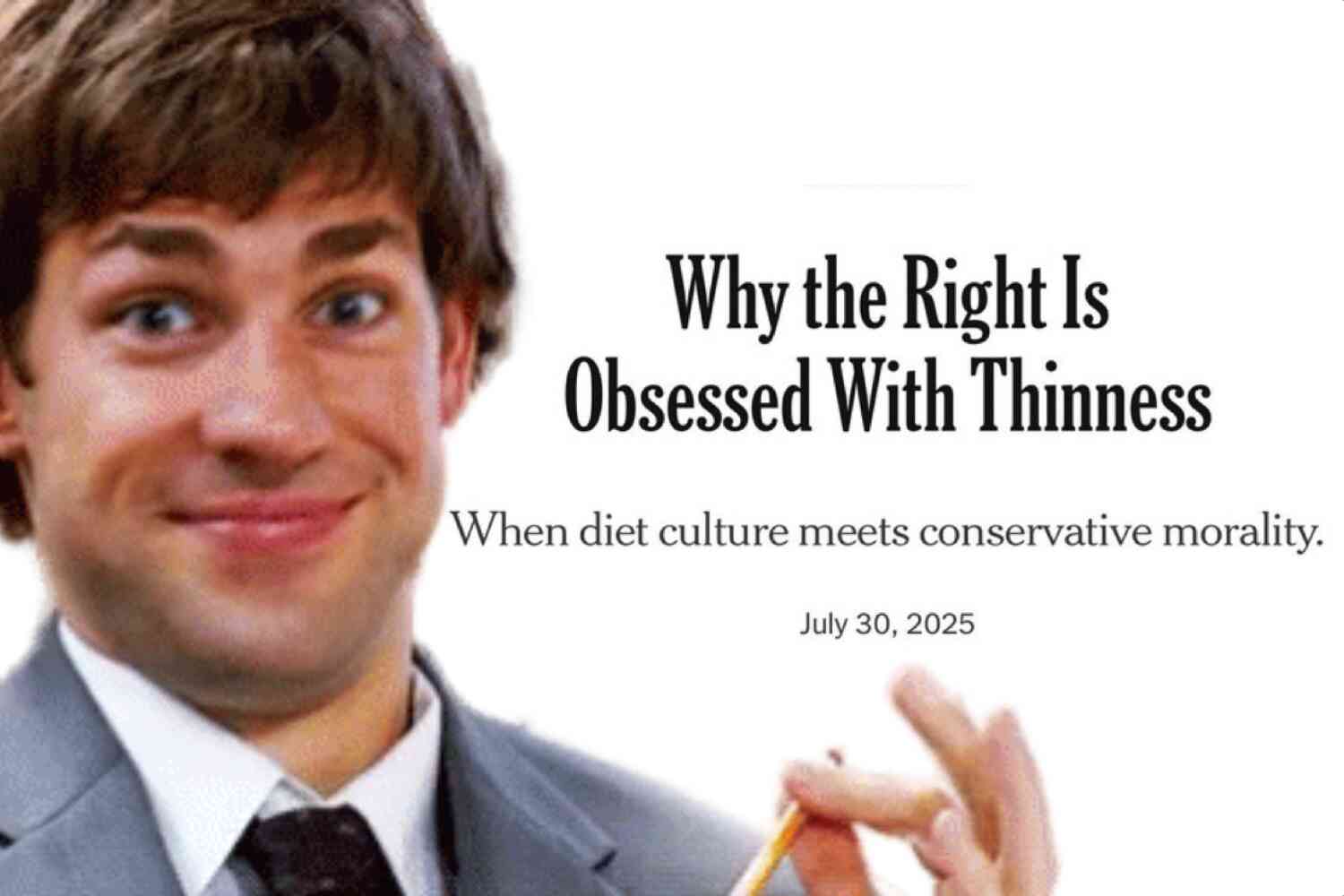Ladies and gentlemen, 40% of Americans are obese. 10% of them are morbidly obese. Our healthcare system - the most advanced in history - is literally buckling under the weight of this epidemic of fatness.
Obesity is estimated to cost the U.S. healthcare system and economy $1.4 trillion dollars yearly. One 2021 study found that medical costs for an obese person were 68% higher than a fit person, with that amount increasing to 234% for morbidly obese people. For perspective, a 5' 9" man is obese at 205 pounds. A 5' 4" woman is obese at 175 pounds.
This is such a problem that nearly 80% of young men don't meet the fitness requirements for military service.
But this week, The New York Times wanted to talk about the dangers of Christian conservatives and their obsession with ... thinness.
The article is a conversation between these two women: Times Opinion Editor Meher Ahmad (left) and columnist Jessica Grose (right) 👇
I don't have time to break down every hilarious quote, but here are a few from their conversation as they talked about Christians, Republicans, and health fads:
Grose: It's all traditional gender roles. That litany of things that [influencer] Alex Clark listed, it's marriage, babies, fitness, protein — it's all one very narrow image. Anyone who is not conforming to that image is sort of outside the circle. It's also in a moment where we do see fewer female leaders across the board — I would say Democrats and Republicans. So the idea that women should be physically smaller goes along with the idea that they're not going to be the ones out front taking up space.
This NYT columnist says Christians/conservatives want women to be thinner so they are easier to sideline 😂
Good grief!
Another hilarious quote:
Grose: ... healthy was always synonymous with thinness in the mainstream, and also it's very white. I think that there's a lot of cultures who are not so obsessed with thinness but we're all reacting to the mainstream dominant public messaging that we're all getting.
Is this the "public messaging" that came to her mind? 🤣
There's lots of studies that show people who are overweight — and especially women who are overweight — are discriminated against. They earn less money, they are treated more poorly in public. It's not just a media creation fixation; it has real-world consequences.
People are less likely to give you promotions to manage their companies if you don't have the self-discipline to manage your own health?

No one would bat an eye if you said that people who have bad hygiene are less likely to earn more money or get positive reactions from strangers in public.
That doesn't mean there aren't people who legitimately have hygiene issues because of health conditions that are out of their control, and that we shouldn't have compassion for those people.
But just as the vast majority of people can manage their hygiene, the vast majority can manage what they eat.
Grose: Well, I mean, I think ultimately they want people to be obsessed with these ideas and never stop thinking about them ...
So I think it is, again, about control. It's about preoccupation. It's about martyrdom. Unless you're punishing yourself, it's not worthy or worth it.
She's not wrong about some of the crunchy trad influencers out there, but she's equating all of that with Christianity and conservatism, neither of which she seems to understand.
Ahmad: When I walked away from [a Ramadan fasting] experience, I also found that the appeal of religion itself in a lot of ways is that it gives you a moral set of guidelines to navigate a very complicated world. When I look at these Christian diet influencers, in a way, the appeal to me is totally apparent because especially when it comes to things like food, American food culture is so confusing. There's so many options. What you're meant to eat, or what powders you should be taking, changes day by day, week by week. There's so much decision making that has to go into everything.
And the guidance on what you should eat, especially with MAHA becoming more part of our culture, there's an inherent distrust of a lot of information. Having just a clear set of guidelines based on something like religion almost feels like a relief. Sometimes I'm envious; I wish I believed in something that just told me how to live my life. So it's interesting seeing how they pair food and food choices and weight loss with religion.
It's interesting that these women started talking about the Right and keep coming back to Christianity.
If I could tell them, I'd say that a lot of the "Christian" diet influencers have nothing to do with Christianity. But Christianity does teach that people should care for the bodies that God gave them.
Proverbs 23:20-21 talks about the dangers of self-indulgence:
Don't associate with those who drink too much wine
or with those who gorge themselves on meat.
For the drunkard and the glutton will become poor,
and grogginess will clothe them in rags.
In 1 Corinthians 6, the Apostle Paul uses food as an illustration for sexual morality. The Christian believes he has freedom in Christ, but freedom from religious obligations and traditions does not mean that everything is beneficial or good. Paul concludes,
Don't you know that your body is a temple of the Holy Spirit who is in you, whom you have from God? You are not your own, for you were bought at a price. So glorify God with your body.
Likewise, in 1 Corinthians 9, Paul says he disciplines his body "keep it under control," but this goes beyond physical fitness, as he clearly states in his letter to his dear friend and student, Timothy:
... while bodily training is of some value, godliness is of value in every way, as it holds promise for the present life and also for the life to come.
Our bodies were made by God. They are good. But sin bends our good desires and instincts in ways no other creature could fathom. Human nature is corrupted - given an excess of power, food, or any other resource, humans will abuse it.
(Or did you think the American Founding Fathers created three branches of government with tons of checks and balances just for funsies?)
The Christian does not need to be a "martyr" by starving himself or herself. Fasting and lifting weights can't save you, nor can any other work.
But the Christian knows that he or she should glorify God with the body and its desires, following His designs and commands, with the goal of learning righteousness and accepting God's discipline as sons and daughters, and with the hope that our temporary, decaying bodies will one day be resurrected.
Grose: ... I totally agree with you that it is really hard to know what to eat and why at this moment. I think where it becomes coercive and controlling is when you're telling people your salvation is tied to the way that you are eating, and if you step off this path, that is akin to consorting with the Devil. I just don't think that that's morally fair to people.
Let me clear this up for Grose, since she's really struggling.
Food can't save you, only Jesus can, and his critics called him a "drunkard and a glutton."
Wanting to be fit and attractive is not a "white" thing.
The reason you kept bringing the conversation back to faith is because Americans are attempting to fill their need for a relationship with their Heavenly Father with new religious rules and duties, which always includes food and fitness.
The idea that women should have a healthy weight has absolutely nothing to do with silencing them.
Your next diet should be a fast from feminism.
I'll let Meg Basham play me out:
Our latest video 👇
Disclaimer: The opinions expressed in this article are those of the author and do not necessarily reflect the opinions of Not the Bee or any of its affiliates.









